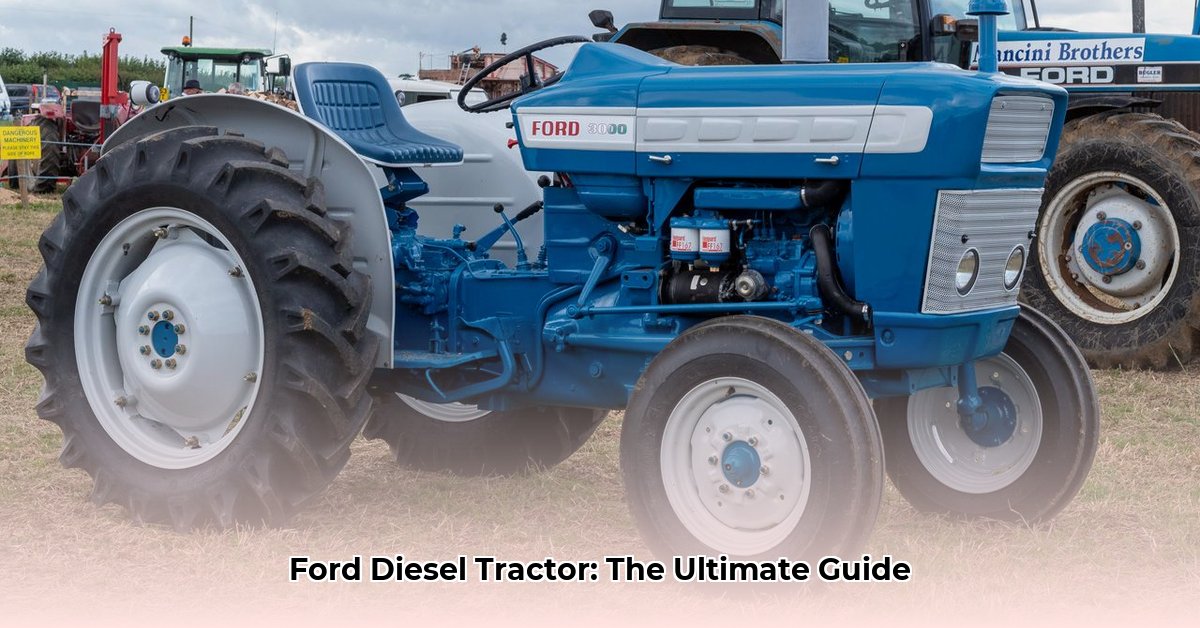
2000 Ford Diesel Tractor: A Classic Workhorse for the Modern Age
The Ford 2000 diesel tractor, a symbol of agricultural resilience from the 1960s and 70s, offers a compelling blend of simplicity, durability, and affordability. Ideal for smaller farms, hobbyists, or collectors, this tractor represents a bygone era of robust engineering. This guide provides a comprehensive overview, assisting you in navigating the market, making an informed purchase, and ensuring long-term ownership satisfaction. For more in-depth information on the 1968 model, check out this detailed resource.
Understanding the Ford 2000: More Than Just a Machine
The Ford 2000 is more than just farm equipment; it's a piece of agricultural history. Its simple yet effective design reflects a time when machines were built to withstand the test of time. While lacking the advanced features of modern tractors, its straightforward mechanics and sturdy construction make it a rewarding investment for those seeking a reliable and potentially easy-to-maintain machine. However, potential buyers should be aware of its limitations compared to modern technology.
Specifications and Variations: What to Expect
The Ford 2000 came in various configurations, mostly differing in engine, transmission, and hydraulic systems. Engine options ranged from gasoline to diesel, with horsepower varying between 28 and 48.4 (drawbar or PTO horsepower; the difference is explained later in the article). Transmission options included four, five, and twelve-speed variants. Fuel tank capacities typically hovered around 13 gallons, while hydraulic system capacity was approximately 2 gallons. These specifications reflect the technology of the time: simpler, but dependable.
Market Value and Pricing: Navigating the Landscape
The price of a used Ford 2000 diesel tractor varies significantly; condition is crucial. A tractor requiring extensive restoration might cost under $1000, while a well-maintained example could reach closer to $10,000. The inclusion of implements (like a front-end loader) and the model year directly influence value. Geographical location is another critical factor. Thorough research of comparable sales in your area is essential before making an offer. Remember, a thorough inspection is non-negotiable.
Locating Your Ford 2000: Where to Begin Your Search?
Your search should begin online, utilizing farm equipment websites like TractorHouse and online auction sites. Local farm equipment dealers often know of privately-owned tractors not advertised online. Remember: always meet the seller in person for a careful inspection of mechanical components, fluid levels, and overall functionality. Investigate the seller's reputation and maintenance history whenever possible.
Pre-Purchase Checklist: Key Considerations
Before purchasing, consider these crucial factors:
Your Mechanical Skills: Honestly assess your mechanical abilities. Can you handle repairs independently, or will you require professional assistance? Older tractor repair differs from modern car maintenance, often requiring specialized knowledge and tools.
Parts Availability: Finding parts can be more challenging than for newer models. Research parts suppliers and local salvage yards in advance.
Matching Tractor to Task: Ensure the tractor's capabilities align with your intended use. While a workhorse, it has limitations. Choosing the right tool for the job is critical.
Weighing the Pros and Cons: A Balanced Perspective
Owning a classic tractor like the Ford 2000 offers advantages and disadvantages:
| Pros | Cons |
|---|---|
| Simple design, easier repairs | Lower horsepower than modern tractors |
| Relatively affordable | More challenging parts sourcing |
| Nostalgic charm, piece of history | Requires mechanical knowledge or access to a mechanic |
| Potential for customization | Limited advanced features, basic functionality |
Long-Term Ownership: Planning for Maintenance and Repairs
Owning a Ford 2000 is a long-term commitment. Budget for regular maintenance, potentially more than for modern tractors. Develop relationships with mechanics specializing in older tractors. Allocate funds for repairs and unexpected expenses. It's an investment requiring consistent attention.
How to Find Affordable Ford 2000 Tractor Parts: A Strategic Guide
Finding affordable parts requires a structured approach. Let's explore the key steps:
Understanding Your Tractor: Precision is Key
Knowing the exact model of your Ford 2000 is paramount. Variations between years significantly impact part compatibility. Use the serial number to identify the precise model. This precision is crucial for accuracy and avoiding costly errors.
Mastering Part Identification: OEM Numbers
OEM (Original Equipment Manufacturer) part numbers are your essential tools. These unique identifiers guarantee you're ordering the correct component. Use these numbers to cross-reference across different online retailers and parts suppliers.
Exploring Sourcing Options: A Multi-Faceted Search
Explore these avenues for finding parts:
Online Marketplaces: Websites specializing in used and new tractor parts offer a wide selection. Compare prices and shipping costs carefully. Read reviews!
Specialized Dealers: Dealers specializing in Ford tractors often have access to hard-to-find parts and offer expert guidance.
Local Salvage Yards: Salvage yards are valuable sources of affordable parts; you might uncover hidden treasures.
Negotiating the Best Deal: Tips for Savvy Buyers
Negotiate prices: Don't accept the first price offered. Compare multiple quotes and don't hesitate to negotiate.
Bulk Purchases: Consider bulk purchasing if you need several parts; many suppliers offer discounts for volume orders.
Seasonal Buying: Purchasing during off-peak seasons can yield lower prices due to reduced demand.
Balancing Affordability and Quality: A Crucial Decision
While cost is important, don't compromise on quality. Low-quality parts can lead to more expensive repairs later. Choose reputable suppliers with positive reviews; genuine OEM parts are ideal but high-quality aftermarket options are often suitable alternatives.
Long-Term Maintenance: Preventing Costly Repairs
Regular maintenance is not just about extending your tractor’s lifespan; it's about preventative cost savings. Addressing minor issues promptly avoids major, more expensive problems down the road. A proactive approach saves money in the long run.